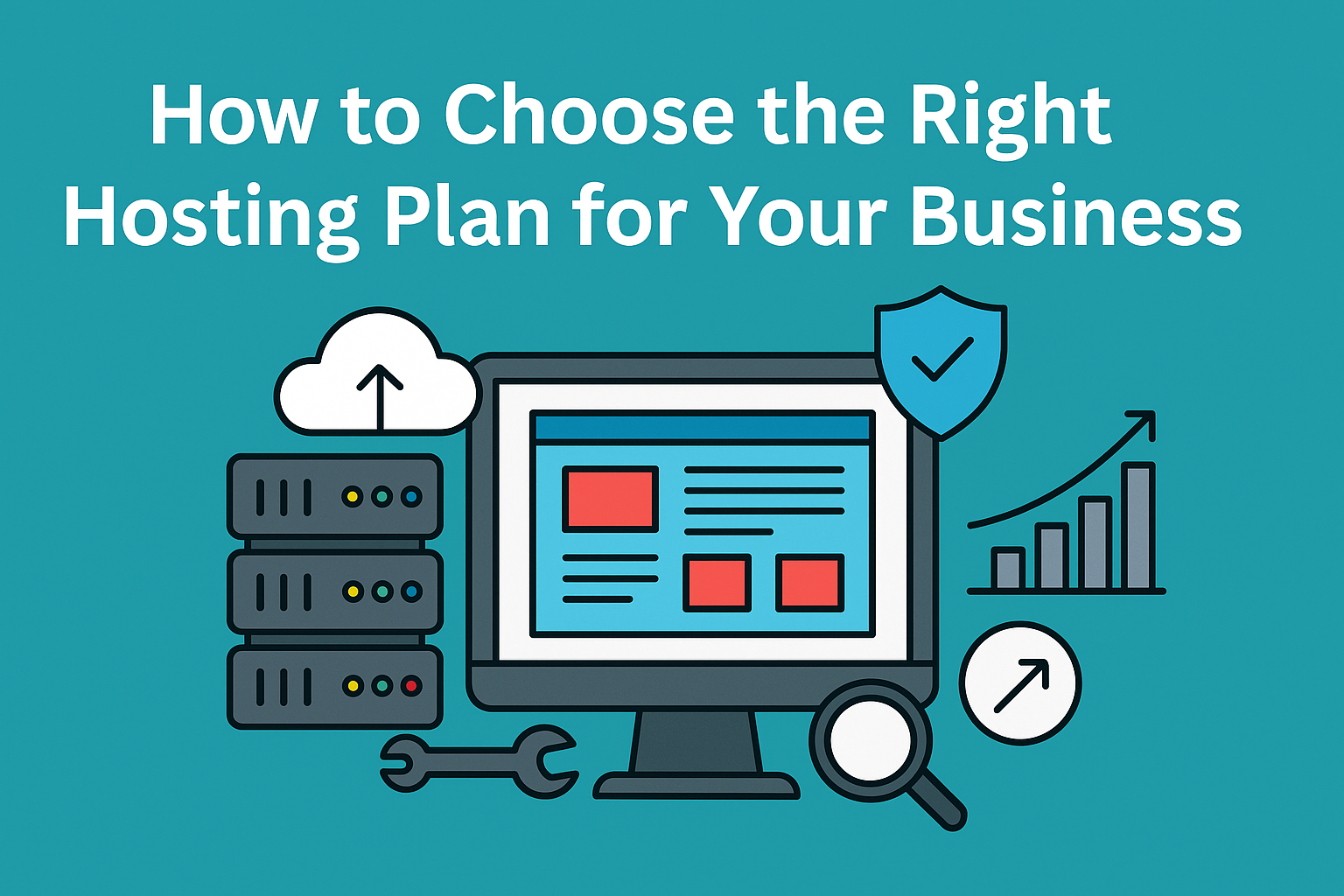How to Choose the Right Hosting Plan for Your Business?

The modern digital world is more than an online presence, a business site is now a key growth, customer, and brand reputation platform. However, one of the initial and the most crucial decisions you will make when creating your web site is the choice of the appropriate hosting plan. The speed, uptime, security, and the overall performance of your website can directly be influenced by the hosting provider that you have.
Most companies commit the error of selecting a plan by the price, without looking at the long-term needs. This can cause slowness of sites, failure during high traffic, or even data leakage. The only way to escape these pitfalls is to be aware of your business requirements, compare the hosting packages, and consider the features that are the most important.
The following is a detailed tutorial on how to select the most appropriate hosting plan to take your business in 2025 and beyond.
Know Your Business Requirements.
The initial thing in selecting a hosting plan is to have a clear evaluation of what your web site is going to need. The following are some of the major questions to be asked:
Is your site going to be more informational (such as a blog or portfolio) or more transactional (such as an e-commerce store)?
What level of traffic do you think you will have at first and what is your desired growth rate?
Do you deal with sensitive customer information that needs extra security?
As an example, a blog on a small startup might not require more than a shared hosting plan, whereas an online store with payment gateways and the big databases will require a more powerful solution such as VPS or cloud hosting.
Discover the Varieties of Hosting.
Hosting plans are not all the same. We can divide the key alternatives:
Shared Hosting
There are several websites that are shared on a single server. This is the cheapest, and it is suitable in cases of startups and small blogs that have low traffic. The performance can however be affected in case other sites on the server are highly trafficked.
VPS (Virtual Private Server) Hosting.
VPS is a step up of shared hosting, where dedicated resources are provided in a virtualized environment. It is perfect to develop businesses that are more stable, secure, and have control.
Dedicated Server Hosting
You have a whole physical server all to yourself. It provides optimum performance, security and customization, which is ideal in large business, e-commerce giants, or an organization that runs heavy applications.
Cloud Hosting
Cloud hosting involves the use of several servers in a network which is more reliable, scalable and has high uptime. It works well with businesses that anticipate a high flow of traffic, seasonal usage, or international users.
Both of them have their advantages and disadvantages, and the correct decision depends on your stage of business, budget, and technical requirements.
Test Performance and Uptime Guarantees.
Customer trust and SEO rankings directly depend on the speed and uptime of the websites. Delayed web loads will increase the bounce rate, and frequent unavailability will damage reputation and revenue.
Find a hosting company that has:
- 99.9% or higher uptime SLA
- Fast server response times
- SSD storage to enhance performance.
- A good host will make sure that your business is online when your customers need it most.
- Security is to be a priority.
- Security is one of the non-negotiable factors with the increase in cyberattacks. An excellent hosting plan must have:
- SSL certificates (to make transactions secure and to gain an advantage in SEO)
- Malicious traffic firewall defense.
- DDoS mitigation to avoid disruption in case of attacks.
- Daily backups that are automated to prevent the loss of data.
- Antimalware software and antivirus software.
In case your business falls under the highly regulated sectors, such as BFSI, healthcare, or government, make sure that the provider also complies with the standards of compliance (HIPAA, GDPR, PCI-DSS, etc.).
Plan for Scalability
A scaling hosting plan is one of the largest errors made by businesses. As your site expands, you will require increased resources – increased bandwidth, storage and processing power.
Hosts with an easy upgrade (shared to VPS, or VPS to dedicated/cloud) will come in handy in the future. Cloud hosting can be the most flexible solution in case of fast-growing business.
Consider Customer Support
Even the most superior technology will have some problems now and then. This is where the solid support becomes very important. An efficient hosting company must provide:
- Available 24/7 (chat, phone, or email) customer support.
- Well trained technical staff who can solve problems fast.
- An elaborate knowledge base or support portal.
- A good support means that there are few downtimes and that the unexpected issues are easily resolved.
- Price Comparison, but Do Not Compromise with Quality.
Although price does matter not all the time it is a good idea to select the lowest priced one. Rather, consider the value a hosting plan has in general. Consider:
- Storage and bandwidth restrictions.
- Security features included
- Scalability options
- Support availability
- It may be worth paying a bit extra to get far better performance, security and peace of mind.
In addition to the essentials, make sure that your host has:
- Hosting of emails using your domain.
- Single-point installation of CMS software such as WordPress, Magento, or Joomla.
- The ability to test the update on staging environments prior to going live.
- Such extras will help you save time, make work easier, and value addition to your hosting plan.
Conclusion
The selection of the appropriate hosting option is one of the most important decisions which influences the speed, security, and scalability of your site. Begin by evaluating your business requirements, analyze the various types of hosting, and never base on price but rather focus on performance, security and support.
Keep in mind that your hosting company is not only a supplier, but a business partner. The right decision will ensure your site can grow without any issues, deal with the growing traffic, and provide a comfortable experience to your customers.
The wiser you are in this decision to-day, the less will be your headaches to-morrow.
FAQs
Q1. What is the best hosting to use when starting a business?
Cloud hosting or shared hosting is normally the best as they are affordable and flexible.
Q2. What is the amount of storage and bandwidth I require?
In the case of a simple site, 5-10 GB can suffice. You can require 50 GB or more and higher bandwidth in case of e-commerce or media intensive sites.
Q3. Is it possible to move to a different hosting plan?
No, the majority of providers permit upgrades or migrations. It is prudent to select a provider whose solutions are scalable.
Q4. Is shared hosting cheaper than cloud hosting?
Initially, yes. However, cloud hosting is more scalable, has better uptime and cost-effective in the long term in case of growing business.



